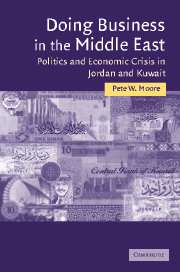Book contents
- Frontmatter
- Contents
- Acknowledgements
- Note on transliteration and translation
- 1 Summers of discontent: business–state politics in the Middle East
- 2 Organizing first: business and political authority during state formation
- 3 Politics and profits
- 4 Crises at century's end
- 5 Is business the solution?
- Appendix Comparative associational data
- Select bibliography
- Index
- Cambridge Middle East Studies 19
5 - Is business the solution?
Published online by Cambridge University Press: 22 September 2009
- Frontmatter
- Contents
- Acknowledgements
- Note on transliteration and translation
- 1 Summers of discontent: business–state politics in the Middle East
- 2 Organizing first: business and political authority during state formation
- 3 Politics and profits
- 4 Crises at century's end
- 5 Is business the solution?
- Appendix Comparative associational data
- Select bibliography
- Index
- Cambridge Middle East Studies 19
Summary
“An old merchant said to a person who wanted to find out the truth about commerce: ‘I shall give it to you in two words [in short]: buy cheap and sell dear. There is commerce for you.’”
Ibn Khaldun, The MuqaddimahAfter decades of economic dislocation and the added turbulence of the 11 September 2001 attacks, policymakers, scholars, and popular commentators have expounded endlessly on the problems of the Middle East and potential solutions. One does not have to look very far to find arguments that business is one solution. Thomas Friedman is one of the more prominent tellers of this story. In his popular book, The Lexus and the Olive Tree, Friedman repeatedly refers to what he terms “the silent invasion going on in the Middle East – the invasion of information and private capital through the new system of globalization.” Friedman equates the olive tree with rootedness and tradition and the Lexus with the economic forces of globalization. In what Friedman cites as his favorite story of the Lexus trumping the olive tree, the author recounts a chance meeting with Jihad al-Wazir, son of Abu Jihad, Arafat's right-hand man, who was assassinated by the Israeli government in 1988. Friedman marvels to find that al-Wazir did not follow in his father's footsteps, but instead headed a trading firm in the Gaza Strip. “That's amazing [Friedman responds]. From Che Guevara to Dale Carnegie in one generation.”
- Type
- Chapter
- Information
- Doing Business in the Middle EastPolitics and Economic Crisis in Jordan and Kuwait, pp. 176 - 190Publisher: Cambridge University PressPrint publication year: 2004

